Some big changes coming! Vrije Universiteit Amsterdam
 Wednesday, October 18, 2023 at 4:53PM
Wednesday, October 18, 2023 at 4:53PM There are some big changes coming! Please see the short video below for more details. We would appreciate your prayers.
 Wednesday, October 18, 2023 at 4:53PM
Wednesday, October 18, 2023 at 4:53PM There are some big changes coming! Please see the short video below for more details. We would appreciate your prayers.
 Tuesday, December 13, 2022 at 10:06AM
Tuesday, December 13, 2022 at 10:06AM 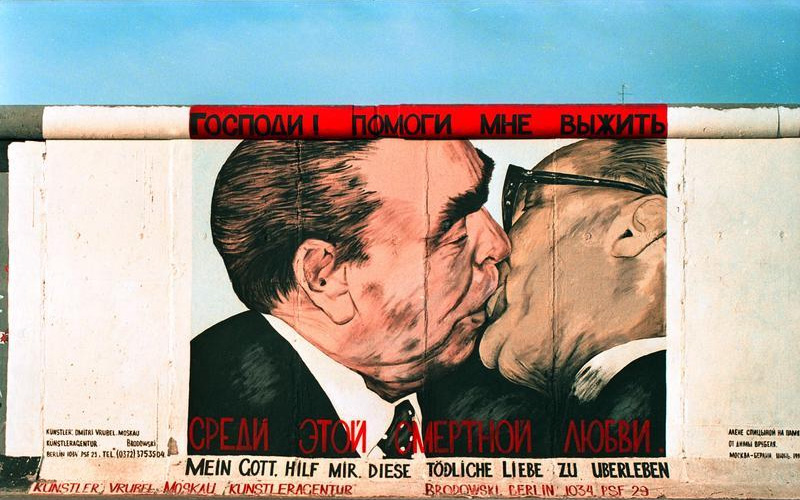 I love Berlin! It is an amazing city. I have been here many times in the last decade. As I write this, I am sitting in my office in the Theology Faculty at the Humboldt University Berlin, looking out over the Spree river towards the Berliner Dom (Lutheran Cathedral) and Museum Island. I am here on an extended stay as part of a research sabbatical. But, of course, there is another side to contemporary Berlin. It is a city whose residents challenge convention and push the boundaries. Graffiti is a common sight as are some rather interesting fashion choices.
I love Berlin! It is an amazing city. I have been here many times in the last decade. As I write this, I am sitting in my office in the Theology Faculty at the Humboldt University Berlin, looking out over the Spree river towards the Berliner Dom (Lutheran Cathedral) and Museum Island. I am here on an extended stay as part of a research sabbatical. But, of course, there is another side to contemporary Berlin. It is a city whose residents challenge convention and push the boundaries. Graffiti is a common sight as are some rather interesting fashion choices.
On my commute from home to the university, I cycled through a tunnel under the S-Bahn (elevated train) near Hackescher Markt, home to all the “cool” stores. Just as the Berliner Dom came into view, I was confronted by a mural by the “Football blackout for human rights” campaign that was pasted over the regular graffiti on the tunnel walls. It read:
“On Dec 10, I’ll marathon-kiss my queer partner in public instead of watching football.”
I think the text is deliberately intended to shock the reader. It is somewhat reminiscent of the famous Berlin mural by Dmitri Vrubel, often referred to as the Fraternal Kiss. It was painted along the Berlin Wall at the East Side Gallery with the inscription, Mein Gott, hilf mir, diese tödliche Liebe zu überleben [My God, Help Me to Survive this Deadly Love]. The famous mural depicts Leonid Brezhnev (Chairman of the Presidium of the Supreme Soviet, 1960–1964 and 1977–1982) and Erich Honecker (head of East Germany under Soviet rule, 1971–1989) engaging in a fraternal kiss. The mural is based on a photograph by Régis Bossu, depicting the two communist leaders engaging in such a kiss in East Berlin on 7 October 1979. There is nothing strange about two men kissing. It is common in many cultures. But the mural elicited quite a stir. Some found it indecent and shocking, and it generated a great deal of public debate.
I am guessing that the artists behind the mural I passed are hoping to create similar discussion. Well, I sat down to write this piece, so it is working to some extent at least! Among the other slogans used by the “Football blackout for human rights” campaign are:
“Today I’d rather drunk-text my ex than watch football”
and “Today I’d rather masturbate all day than watching football.”
For me, the juxtaposition of what society deems “decent” (the Berliner Dom and the grand Museums) against the seemingly indecent slogans of the “Football blackout” campaign raised important questions about how we make sense of the world and construct our values. Let me explain why.
I started my sabbatical research in July 2022 by delivering one of the more important lectures of my career to date, my inaugural lecture as Professor of Public Theology and Ethics at Stellenbosch University (see, Counterpoint). In the lecture, I wrestled with “living more decently in an indecent world.” Since then, I have been speaking, teaching, and researching at some of the more “decent” Universities in Germany and the UK (Cambridge, Heidelberg, Bamberg, and Berlin). A lot of my conversations with students and colleagues have centered around the tension between the need for both decency and indecency in contemporary theology.
In my lecture, I was not advocating for a kind of “decent theology,” or “decency ethics.” I realize that what is presented as “decency” in some settings can be used to oppress sexual minorities, to stifle racial and ethnic diversity, or to “other” persons from non-dominant cultures.
Rather, I tried to imagine how a person might live a moral life, a good life, a life of greater justice that is directed towards the common good in the midst of many contemporary indecencies (such as poverty, racism, sexism, homophobia, and war). Moreover, I wanted to discern what we should do when these indecencies are held in place or strengthened by indecent systems and institutions, to the extent that—by means of economic, political, and religious systems—their actions and values, even in so-called “decent” societies have become indecent.
Consider the different treatment given to Syrian and Ukrainian refugees in Europe, or the religion that is used to oppress sexual minorities, or sport that is used to “purpose-wash” human rights abuses. We need a measure of decency to counter structural and systemic indecencies that humiliate and dehumanize people. The Israeli philosopher Avishai Margalit asserts that a “decent society is one whose institutions do not humiliate people.”
Though my focus then was on decency, I realize that we also need a measure of indecency to call into question some of what we have come to uncritically and unquestioningly present as “proper,” “acceptable,” and “justifiable” in contemporary politics, economics, and religion. I would characterize “oppressive decency” as a form of arbitrary, parochial narrow- mindedness.
To combat that, advocating for some measure of indecency in contemporary life is not without peril. Some groups may claim that their acts of racism, antisemitism, xenophobia, and homophobia further their version of what is good. In such instances we need to defer to greater decency—such as upholding our common humanity, fostering deep solidarity, and working courageously and tirelessly for universal justice. In short, we need to maintain a critical tension between both indecency and decency in our pursuit of the common good, and the lasting good.
So, my question is, what is the decent thing to do when encountering structural and systemic indecency in society? The decent thing to do may just be indecent by some contemporary standards.
The late Argentinian theologian Marcella Althaus-Reid suggested that in situations where systemic and structural oppression has been normalized, we need to develop an Indecent Theology that “troubles” some of these ossified and uncritically accepted “decent” beliefs and practices that lead to injustice and oppression. When her book was first published, it caused a major stir in “decent” theological circles. The South African queer theologians Hanzline Davids and Ashwin Thyssen argue that this “stir” is good as it “disrupts, transgresses, and erases stable binaries” such as heteropatriarchy, white supremacy, western supremacism, and the economic, political, and social systems that give these binaries the power to dominate and subjugate.
As I cycled away from the protest art in the S-Bahn tunnel, I was left wondering, for example, why I, and likely many other persons, have no moral problem watching the 2022 World Cup matches in Qatar, where there are indecent abuses of the human rights of LGBTQI+ persons, women, migrant workers, and many others. Yet, I feel morally challenged by an artwork advocating a “marathon queer-kissing session in public.”
The protest art helped me to realize that what I consider decent may in fact be indecent and that I needed a certain measure of indecency to help me to re-evaluate—literally to reconsider what I value or more pointedly re-evaluate what my values are based upon. Lisa Isherwood, the famous “body theologian” who uses our lived, embodied human experiences to think about God and relationship to God, wrote an appreciative (and critical) response to Althaus-Reid. Isherwood’s response is titled, Indecent Theology: What F-ing Difference Does It Make? She contends that indecent theology could help us to move towards a more honest, truth-telling theology.
So, I would like to invite you to dwell with those things that make you feel uncomfortable, that unsettle your sensibilities, that destabilize your social and historical values. What is it about them that makes you uncomfortable? What unquestioned values do they challenge? A bit of indecent theology might just be what is necessary to make a “f-ing difference” for the sake of a more decent world.
[I wrote this article for Counterpoint Knowledge. It was first published on 7 December 2022]
 Sunday, October 28, 2018 at 10:29AM
Sunday, October 28, 2018 at 10:29AM The Irish theologian, Peter Rollins, was part of a unique Church community in New York City called 'IconNYC'. If I understand it correctly, it was a year long experiment in Christian community that sought to consider the Christian journey, indeed the Christian community, in ways that held the tensions of doubts, uncertainties, and the realities of our struggles with belief.
Having some understanding of how the brain works, I realise how difficult it is for us, as human beings, to live with uncertainty. Our neuro-evolution has formed us to want patterns, to create certainty and predictability, for the sake of our survival. This can be seen in how we seek out communities of belonging that we understand (what in inter-group contact theory is called 'in-group' identity). We can understand how persons of a certain race, culture, economic class, religion, think and behave. So we seek sameness, and become afraid of difference. This leads to inter-group contact anxiety between the self and the other. It is not surprising to me that Americans want to build a wall, that European countries are trying to keep migrants out, and that racism and identity politics continue to thrive in South Africa. None of these things is just, right, or even desirable. Yet, we fall into the traps of self interest, and self protection. We are wired for it to a certain extent.
However, we soon find that even in the in-group there are differences. White protestant women in Chicago, IL see the world differently from white protestant men in Birmingham, AL. Not all South Africans see the world in the same way... You get the idea.
In my experience, the pursuit of certainty is painful, it is limiting, it binds us to our fears, instead of releasing us for freedom.
The 'IconNYC' community, and Peter Rollins' 'Pyrotheology' speak to me as I contemplate these issues. I am currently in Gothenburg in Sweden. Here I am the cultural, linguistic and geographical stranger (not to mention a stranger to the climate! I realised yesterday as it snowed, that my body was formed from the African soil, and baked in the African sun!) Yet, the difference, the strangeness, the doubts, can be OK. I can learn about others, and about myself. I can slow down and listen - paying a little more attention to unfamiliar people, places and experiences. And the difference becomes a gift. I don't have to collapse it into my world-view, or contain it in my understanding or experience. I can just participate, observe, experience, and know what I can.
It is a sacred experience. It reminds me that God is Swedish... And also African... And Asian... You get the idea? We are because of who God is. Our diversity is an expression of God's creativity.
Here is what Rollins had to say about uncertainties, doubts and pyrotheology:
The good news nestled in the heart of Christianity is not that which gives us certainty and satisfaction, but rather is that which helps us embrace our un-knowing, our doubts, and our dissatisfaction… Instead of seeking a burning bush, a place where God is, we will discover that every bush is burning, that everything is sacred and full of depth, if we only have eyes to see.- Peter Rollins, Pyrotheology
 Sunday, August 19, 2018 at 10:42PM
Sunday, August 19, 2018 at 10:42PM This evening I arrived home from the UK and we watched the #Heartlines movie 'Beyond the river' as a family
It is such a powerful and moving reminder of the possibility and hope that exists in South Africa.
We face some very significant challenges. Yet, we can work for a better future for all South Africans. Our diversity is our strength. Thank you Garth Japhet and team for the amazing work you are doing. I am so grateful to be home, and grateful for this powerful initiative #WhatsYourStory
Watch the trailer for 'Beyond the river' here.
You can find out more about the 'What's your story?' campaign from 'Heartlines' here: https://heartlines.org.za/media-campaigns/whats-your-story/
 Friday, August 10, 2018 at 10:09AM
Friday, August 10, 2018 at 10:09AM 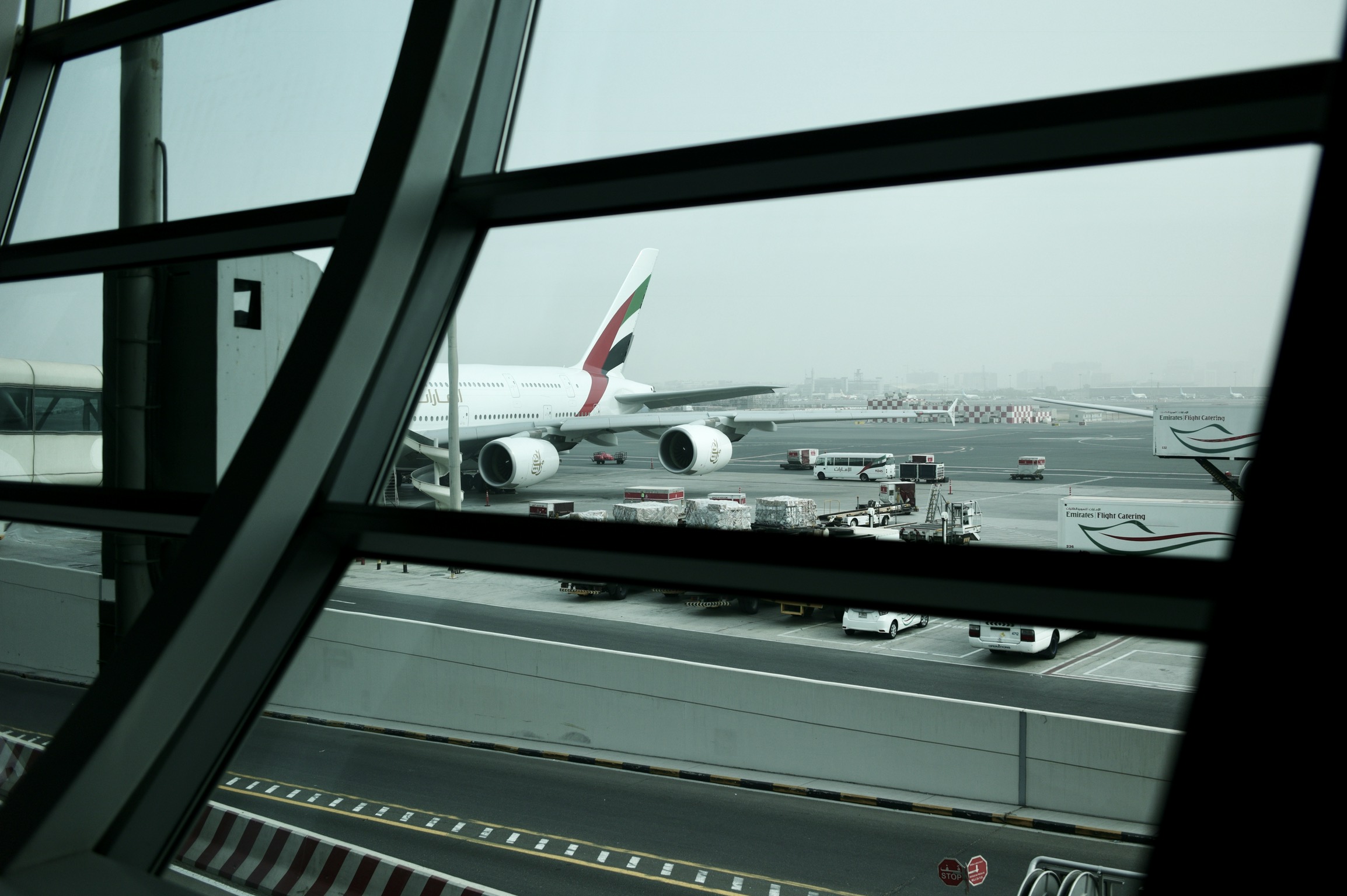
 Friday, December 22, 2017 at 8:22AM
Friday, December 22, 2017 at 8:22AM This has been a year to remember! Forgive me, but this is a bit of a rambling post! Please feel free to skip it if you get bored. I have used this post as an opportunity to re-collect many of the important people, events, places and happenings in 2017.
At the outset I want to say how mindful I am that the blessing of this year comes from the many wonderful people and communities that I am priviliged to be associated with. I have received much more than I deserve, and in many instances, been recognised for work that belongs to a group of persons, not just to me. In addition to this, I am also mindful that any achievement is only worthwhile if it can lead to service. My hope is that the work of this year bears fruit for my students, for the Church I serve, for the people of the world that God so loves, and in some small way may help us to honour and protect the dignity and sanctity of humans and creation. This is about Christ, and community, and undeserved grace.
As I was reflecting on this year I was struck by this beautiful quote from Dietrich Bonhoeffer's, 'God is in the manger':
'While we endeavor to grow out of our humanity, to leave our human nature behind us, God becomes human, and we must recognize that God wants us also to become human—really human. God raised his love for human beings above every reproach of falsehood and doubt and uncertainty by himself entering into the life of human beings as a human being, by bodily taking upon himself and bearing the nature, essence, guilt, and suffering of human beings. Out of love for human beings, God becomes a human being. This is about the birth of a child, not of the astonishing work of a strong man, not of the bold discovery of a wise man, not of the pious work of a saint. It really is beyond all our understanding: the birth of a child shall bring about the great change, shall bring to all mankind salvation and deliverance.' – Dietrich Bonhoeffer, God Is In the Manger
I am truly grateful for this year!
It included, my daughter finishing high school and getting accepted to study at Stellenbosch University! Courtney also got her drivers license this year. My wife, Megan, completed a brilliant Masters degree, and my son Liam, is going to Grade 5!
I continued so serve as the Chair of the Department of Systematic Theology and Ecclesiology and the Director of the Beyers Naudé Centre for Public Theology in the Faculty of Theology at Stellenbosch University. I am so grateful for the opportunity to do the work that I do. I truly feel like I am fulfilling my calling and spending my time and energy among magnificent people, doing interesting and worthwhile things - I am in my 'sweet spot'!
Here are a few of the highlights:
Among my highlights in teaching and learning were:
Travel and conferences. I travelled a fair amount in 2017 (16 trips, of which 8 were overseas):
As I write this I am on leave. There is a great deal to look forward to in 2018! I am due for research leave in 2018 and have been invited to undertake some part of that research leave in Sweden at the University of Gothenburg's department of Religious Studies and Theology. I will also be spending some time in Oxford for the Oxford Institute for Methodist Theological Studies. And if my Humboldt Stiftung (Fellowship) is successful (please say a prayer!) I shall be spending some months in Berlin! It is my hope that Megie, Courtney and Liam will be able to join me for parts of those trips.
So, as the year ends, I want to give glory to God, express my love for my family, and give thanks to my colleagues and friends. I am truly grateful to share in this journey with each of you. May we continue to offer our selves, our resources, our passion, our training, our intellect, our creativity, and indeed our very lives, for the development of the common good, for justice, for peace, and for fullness of life.
I share my last little video for the year (recorded on the Campus of Princeton University) on the politics of forgiveness with you. May you be blessed at Christmas, revived, renewed, and replenished for what lies ahead.
 Thursday, October 12, 2017 at 2:46PM
Thursday, October 12, 2017 at 2:46PM 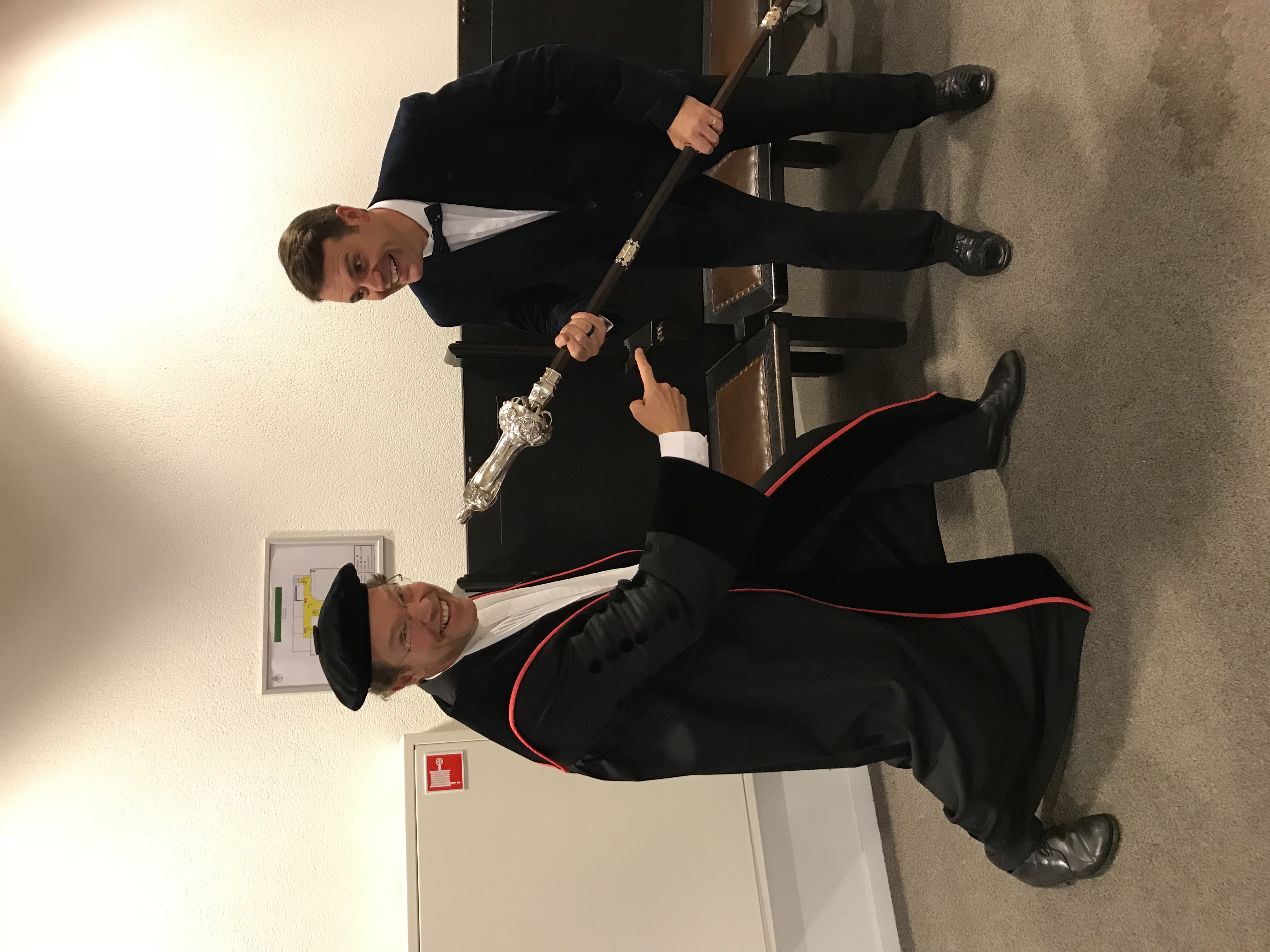 Yesterday was a truly amazing day! At exactly 16.30 (11 October 2017) I defended my PHD (which you can read about here) at Radboud University, Nijmegen. It was a wonderful joy to share it with my wife Megan. At Dutch Universities the defence and graduation takes place at the same time. Your dissertation (once completed) gets examined, and then you have to publish it as a book (which I did - see the previous link for details). Then you defend it in public, and the degree gets awarded at the same event! It was exciting, but also rather scary at the same time! I am so grateful that it is done and the degree of ‘Doctor’ has been awarded (which means that I now hold two PHD’s, one in Systematic Theology and one in New Testament studies).
Yesterday was a truly amazing day! At exactly 16.30 (11 October 2017) I defended my PHD (which you can read about here) at Radboud University, Nijmegen. It was a wonderful joy to share it with my wife Megan. At Dutch Universities the defence and graduation takes place at the same time. Your dissertation (once completed) gets examined, and then you have to publish it as a book (which I did - see the previous link for details). Then you defend it in public, and the degree gets awarded at the same event! It was exciting, but also rather scary at the same time! I am so grateful that it is done and the degree of ‘Doctor’ has been awarded (which means that I now hold two PHD’s, one in Systematic Theology and one in New Testament studies).
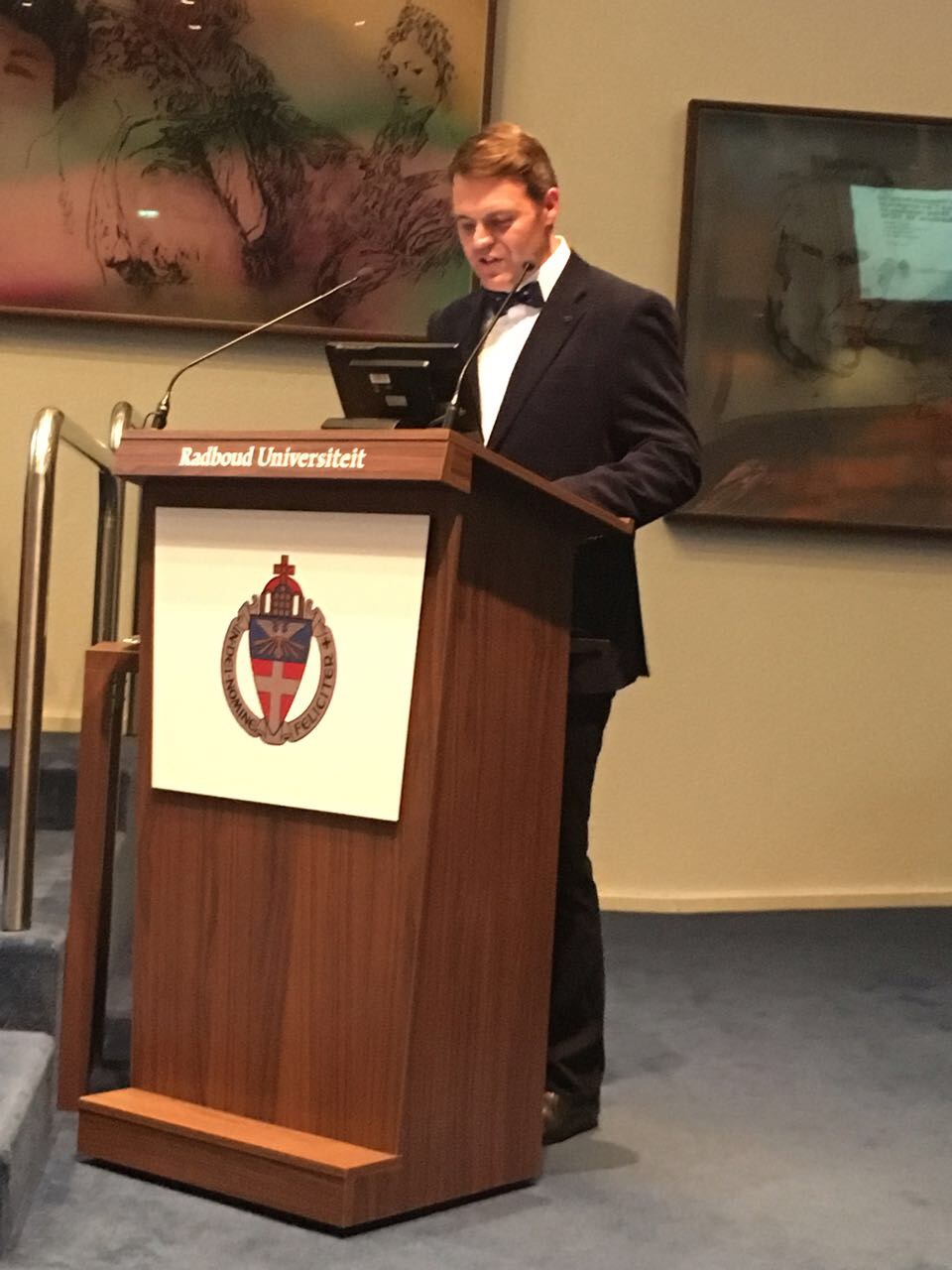 You can watch a little video about the build up to the defence below. And here are a few pictures from the event (with the ‘pedel’ / ‘beadle’) who was a great sport! My thanks to Radboud University, my supervisors, Prof Jan van der Watt and Prof Chris Hermans, to the communities that participated in the research (they matter most in this project!) and to my wonderful family for their love and support.
You can watch a little video about the build up to the defence below. And here are a few pictures from the event (with the ‘pedel’ / ‘beadle’) who was a great sport! My thanks to Radboud University, my supervisors, Prof Jan van der Watt and Prof Chris Hermans, to the communities that participated in the research (they matter most in this project!) and to my wonderful family for their love and support.
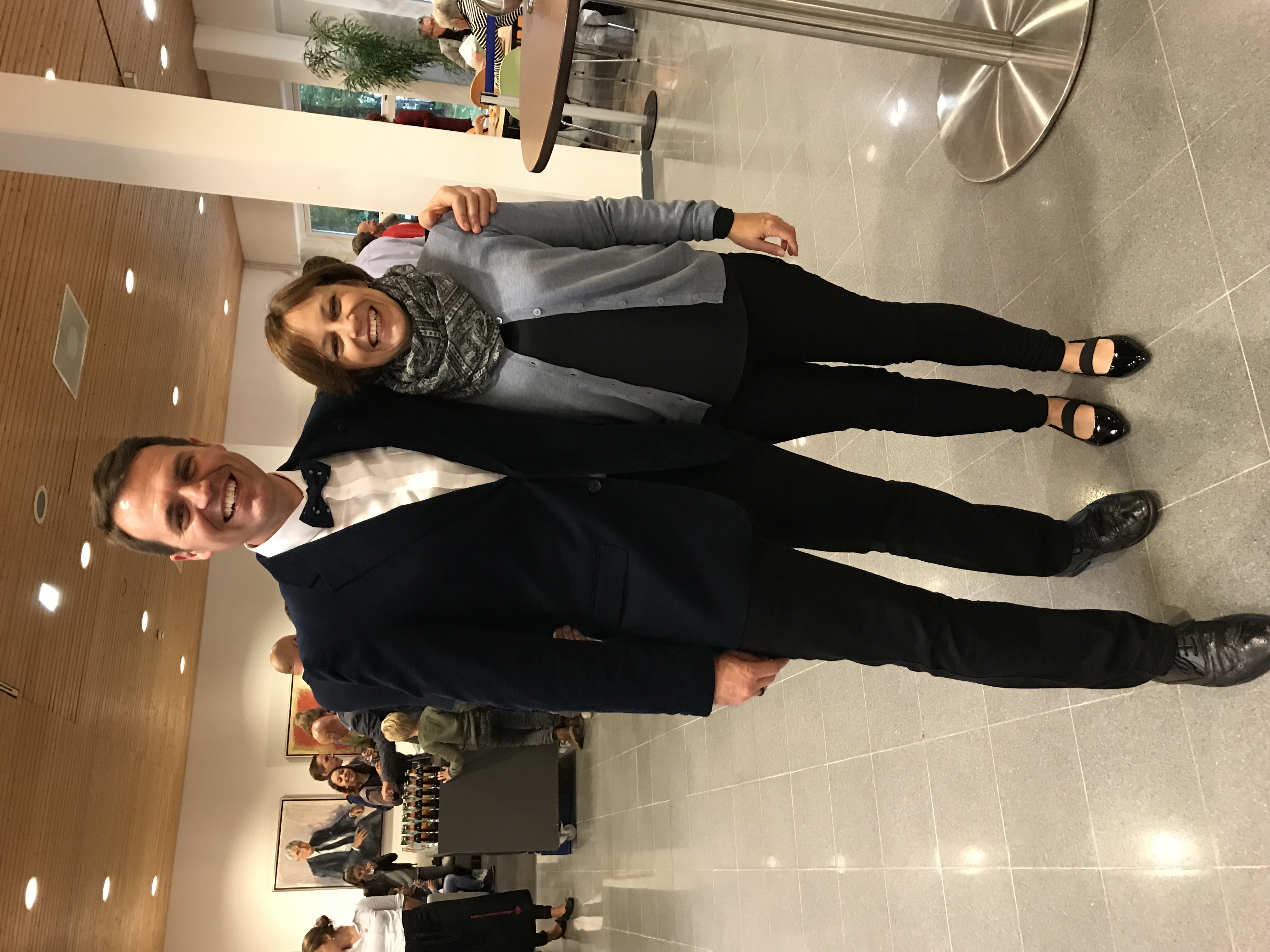
 Friday, October 6, 2017 at 1:29PM
Friday, October 6, 2017 at 1:29PM 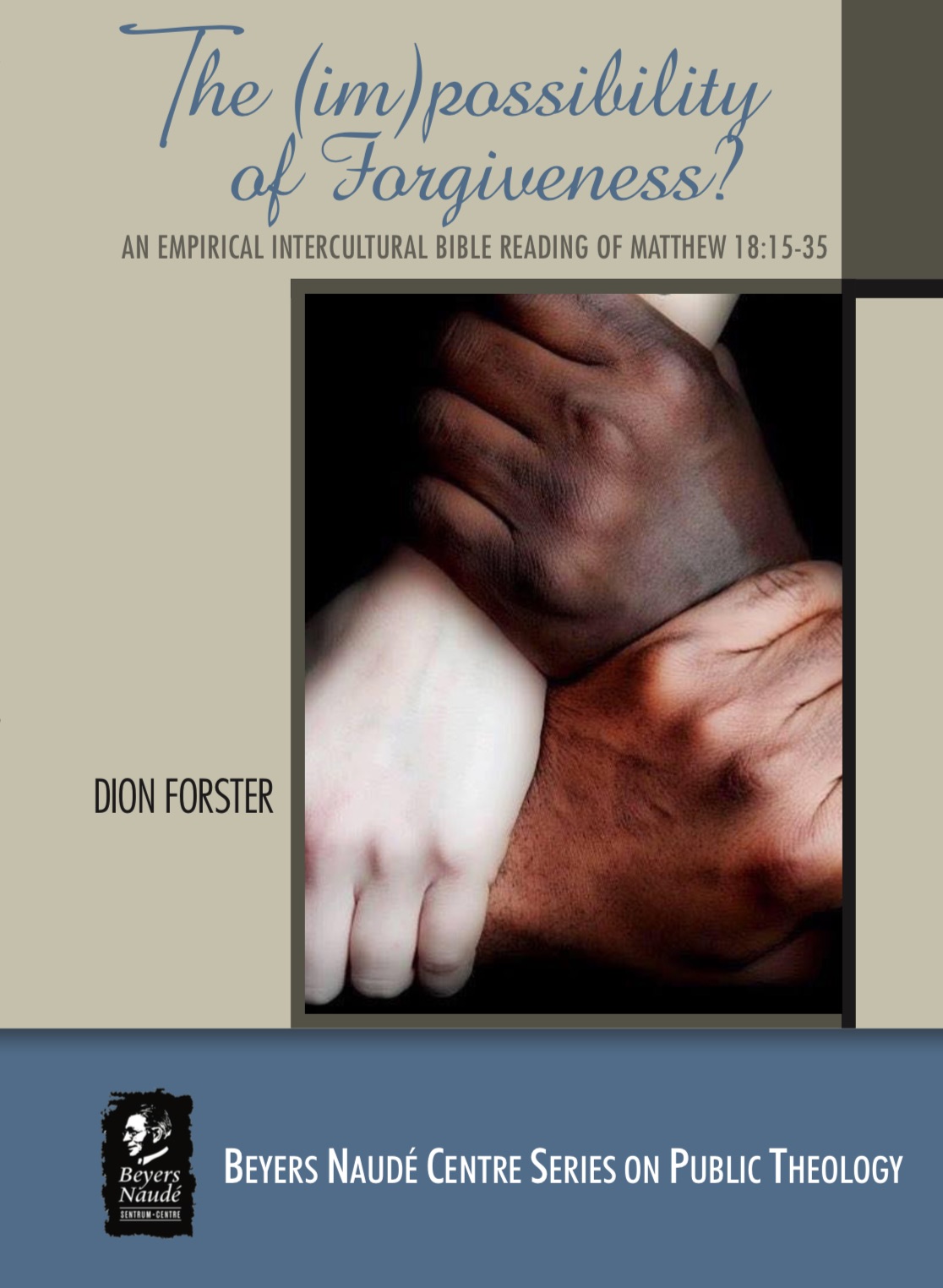 I am so grateful to be traveling to the Netherlands tomorrow (with my wife Megan!) to graduate with my 2nd PHD at Radboud University, Nijmegen in Holland.
I am so grateful to be traveling to the Netherlands tomorrow (with my wife Megan!) to graduate with my 2nd PHD at Radboud University, Nijmegen in Holland.
The graduation ceremony (and defence) will take place at 16.30 on Wednesday 11 October 2017 - if you read this beforehand you can watch the ceremony online via this link.
I started my research at Radboud University in December 2013. I worked on the project, and spent some wonderful months, at Radboud University between then and May 2017 when I completed the manuscript / dissertation. You can read all of my posts from Radboud and about this research (in reverse order!) via this link.
The research project is entitled:
The (im)possibility of forgiveness? An empirical intercultural Bible reading Matthew 18:15-39.(Click the title to read an excerpt from the book and see the table of contents).
In Holland it is required that the dissertation is published as a book. It has been published by African SUN Media in the Beyers Naudé Centre for Public Theology series on public theology.
Here is the full reference:
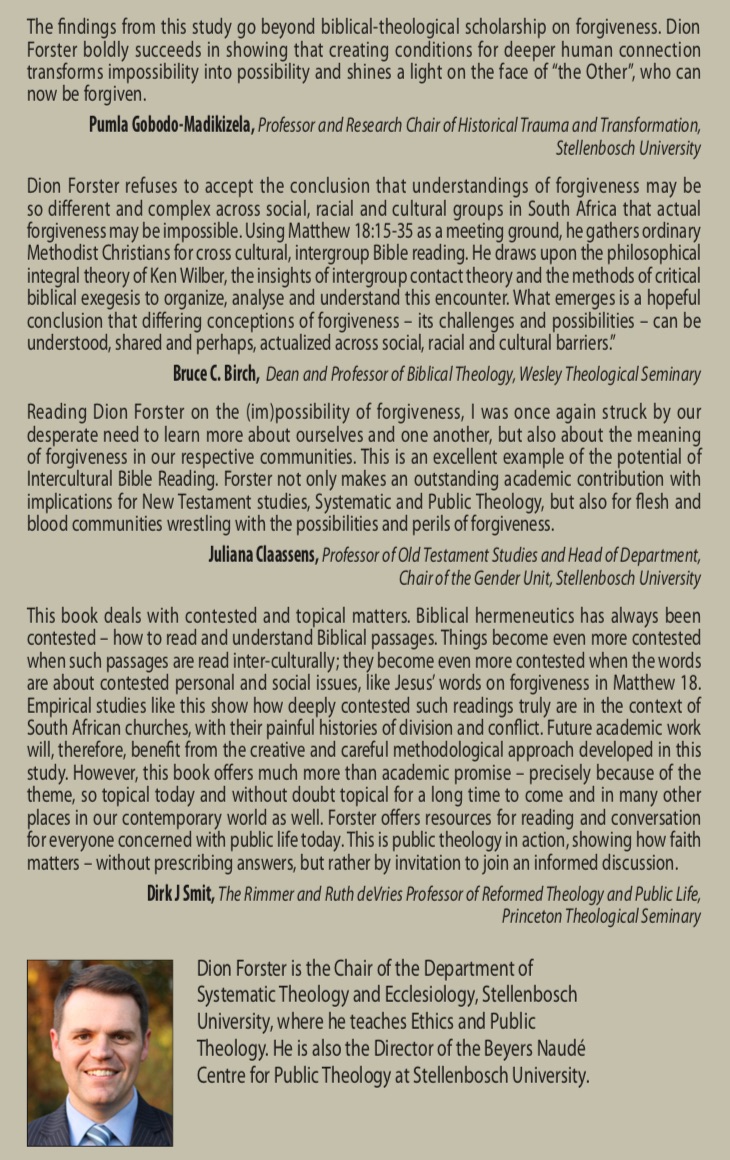 You can read the abstract below, and see copies of the cover of the book and the commendations in the attached images. If you would like to purchase a copy you can do so via African SUN Media.
You can read the abstract below, and see copies of the cover of the book and the commendations in the attached images. If you would like to purchase a copy you can do so via African SUN Media.
I have some sections of the book under review for publication, and have already published the following article which is a shortened section of the Biblical exegetical component of the study:
I made one or two short videos of some of the central concepts (see the bottom of this post for a discussion of the empirical qualitative aspects of the study, and a discussion of one of the primary theoretical components).
I am truly grateful to my promoters, Prof dr dr Jan van der Watt and Prof dr Chris Hermans. They were encouraging, supportive, and wonderful guides along the journey. I learned so much and I am so grateful for the findings of the research and the fruit that it will bear for the participating communities.
Here is a video I recorded at my home University (Stellenbosch University) where I discuss how I worked with the participants to gather and analyse the theological (qualitative empirical) data on forgiveness.
In this video (recorded in Nijmegen at Radboud University) I discuss one of the primary theories that I used in the study, namely inter-group contact theory.
Here is the abstract from the dissertation:
This project engages the complexity of understandings of forgiveness in Matthew 18.15-35 within the context of an intercultural Bible reading process. The study shows that concepts of forgiveness among South African Bible readers are diverse, containing nuanced, and even conflicting, expressions and expectations - a politics of forgiveness. Some have suggested since such entrenched differences in understandings of forgiveness exist in South Africa, that forgiveness may be impossible. However, in spite of this complexity it is suggested that South Africans, and South Africa, could benefit from a rigorous academic engagement with the theologically and culturally diverse understandings of forgiveness that emerge from reading Matthew 18.15-35 in an intercultural Bible reading setting. The knowledge gained from this study may help persons from diverse histories, cultural identities, racial identities, and economic classes, to gain more integral, shared, understandings of forgiveness. In this sense, at least, the possibility of forgiveness may emerge.
Considering the above, the aim of this study is to produce rigorous, textured, and credible theological insight into the complexity of differing understandings of forgiveness in Matthew 18.15-35 from 'ordinary' Bible readers of different cultures who are members of the same Christian denomination - the Methodist Church of Southern Africa, Helderberg Circuit. This is achieved through structuring the study as a practice oriented research project in empirical intercultural Biblical hermeneutics.
Three theories informed the research design. First, Ken Wilber’s All Quadrants All Levels (AQAL) integral theory is used as a philosophical framework that provides language and structure to ‘plot’ the theological understandings of forgiveness in the text, and in the reading of the text. Second, intergroup contact theory is used to identify the mechanisms and processes for positive intergroup contact that inform the intercultural Bible reading sessions. Third, the Biblical text is engaged in a scholarly exegetical process so as to avoid collapsing the thought world of the text into the contemporary context. This is a critical aspect of a credible engagement with the Biblical text. This process allows for the construction of a hermeneutic bridge to link aspects of the text to aspects of the interpretive insights of the contemporary readers engaged in this study.
As anticipated, the findings of the research process agreed with some aspects of the research hypotheses and varied from others. The findings of the post intervention research data and analysis shows that to a large extent (except for minor variations which are discussed in the study) the participants of the intercultural Bible reading intervention developed more integral understandings of forgiveness. This means that participants were far more open to accepting understandings of forgiveness that were not held within their in-group, but were more common among members of the out-group.
The primary conclusion of this study is that more integral theological understandings of forgiveness are evidenced among the majority participants in this intercultural Bible reading process which was conducted under the conditions of positive intergroup contact. Moreover, this study shows that one can give credible empirical content to, and explicate, the theological perspectives, and the hermeneutic informants, of readers of the Biblical text. This helps the ‘problem owner’, (i.e., the Methodist Church of Southern Africa, Helderberg Circuit), to understand what some of the barriers to shared understandings of forgiveness may be. Moreover, it allows for the design of intercultural Bible reading interventions under the conditions of positive intergroup contact. The data shows that in this case, the participants of this study mostly became more open to a more integral theological understanding of forgiveness with the ‘other’.
This project makes the following novel contributions to scholarly knowledge and the construction of theory: In New Testament studies the research contributes towards a number of new hermeneutic opportunities that arise from reading the Biblical text from a social identity complexity perspective (informed by Ken Wilber’s integral AQAL theory). Moreover, in relation to intercultural Bible reading, the project provides new insights into how persons who hold different socially informed views of forgiveness may encounter one another constructively under the conditions of positive intergroup contact. In terms of empirical cultural Biblical hermeneutics this study is the first of its kind to provide insights into how Black and White South African Christians understand the concepts and processes of forgiveness in relation to Matthew 18.15-35. The findings show that there is a logic behind the socially informed theological understandings of forgiveness that are expressed by the participants. This holds value not only for Biblical Studies, but also for Systematic Theology in general, and South African Public Theology in particular. Then, from a methodological point of view, the interdisciplinarity of the theoretical approach that is employed in this research stimulates new avenues for scholarly theological study in relation to problems in practice.
Thanks for checking in and sharing in my joy! I appreciate it.
 Tuesday, August 1, 2017 at 1:54PM
Tuesday, August 1, 2017 at 1:54PM It has been almost two weeks since I returned from Cambridge. I had the privilege of teaching on a Doctor of Ministry course at Wesley House, Cambridge University. This particular degree is co-hosted by Wesley House and Wesley Theological Seminary in Washington, DC. My senior colleague, and friend, Prof Bruce Birch (the Dean of Wesley Seminary) had invited me to teach on the course. It was such a wonderful blessing to be able to visit Wesley House again. I have been a friend of the Principal of Wesley House, Dr Jane Leach, for more than a decade.
You can find out more about this magnificent doctoral course at this link - I can highly recommend it for anyone who desires to engage in relevant, critical, theological study that will make a contribution in Church, society and academy.
The 'cohort' of students that I had the joy of spending a week with were amazing. It was a diverse group of academics from all across the world (18 in total, one colleague from Liberia could not get a visa). Each of them had a particular connection to the Church and was seeking to develop as both a theological and ministry leader to better serve in their context. The class discussions were deeply challenging, lively, and of an extremely high level. I was so impressed by the persons, their experience, knowledge and preparation for the course.
The week on which I taught aimed to bring together an understanding of Christianity as an historically 'glo-cal' phenomenon i.e., a faith that is globally oriented, yet locally contextualised. During the week we considered a number of aspects of the history, theology, geography, culture and demography of different Christianities across the world and across history.
We read Kim, S. & Kim, K. 2016. Christianity as a World Religion: An Introduction. London: Bloomsbury Academic. It is a wonderful 'survey' text that traces the development of contextual expressions of Christianity across the continents of the world in historical and theological detail. I can highly recommend this book.
In addition we also considered the work of Taylor, C. 2009. A Secular Age. Cambridge, MA: Harvard University Press. And some exceprts on the role of religion in public life from the brand new book: Kim, S. & Day, K. Eds. 2017. A Companion to Public Theology. Leiden Bosten: BRILL.
It was just such a wonderful experience to be in community at Wesley House - it is truly one of the most remarkable places of learning - a true scholarly community with a deep commitment to academic excellence and spiritual discipline. I learnt a great deal from the colleagues on the course, and in my preparation to teach the course was once again inspired and challenged to think critically and carefully about the role of the religion (and the Church) in public life. It can be a great source for good, but also a space of struggle. I was reminded just how much good work Christians and Churches do, and how much more work there is to do in service of God's Kingdom and humanity and the planet's wholeness.
Below are two videos: First, is a video I recorded in Cambridge on the content of the course and some of our focus points in Christianity as a Global / World religion. My thoughts were a little scattered, and I was also a little destracted by the persons walking past. But, it gives some idea of what I was thinking.
Second, I would commend this video, recorded with Prof Jan Jans from Tilburgh University (about a year earlier) on the death of religion and the rise of spirituality in Europe. It is also a very interesting discussion! Jan is a great friend who visits us at Stellenbosch each year. I love his energy and insights!
As always I would love to hear your thoughts, and ideas. How do you express your faith in your context? What is the role of Christianity and religion in your community?
 Wednesday, June 21, 2017 at 8:46AM
Wednesday, June 21, 2017 at 8:46AM I am coming to the end of a magnificent trip to Berlin, Germany. I arrived here almost three weeks ago to speak at and participate in a number of events. The title of this blog post is 'A matter of conflict? Politics and sustainable development?' It seems, as I reflect on my time here, that I have given a lot of time to thinking about the relationship between an ethics of justice and an ethics of care - how do we work of a world in which no one has too much while anyone has too little? How do we transform economic, social and political systems for the common good AND at the same time care for one another and the environment. This is the 'site' of conflict, that intersection between justice and care. My colleauge Dr Carike Noeth is a specialist in this field of study (having completed a great PHD on the ethics of care (and justice!) last year. So, this has occupied a lot of my thinking.
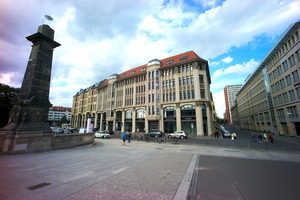 Prof Torsten Meireis, a senior colleauge in Ethics and Public Theology - who is a Professor at the Humboldt Universität zu Berlin - invited me to participate in some events here in Berlin during the summer. It has been such a wonderful and significant visit. I have had the privilege of participating in a number of academic conferences, the G20 meetings in Potsdam, visiting and doing a lecture at Bamberg University, and working on a joint research project with Prof Meireis.
Prof Torsten Meireis, a senior colleauge in Ethics and Public Theology - who is a Professor at the Humboldt Universität zu Berlin - invited me to participate in some events here in Berlin during the summer. It has been such a wonderful and significant visit. I have had the privilege of participating in a number of academic conferences, the G20 meetings in Potsdam, visiting and doing a lecture at Bamberg University, and working on a joint research project with Prof Meireis.
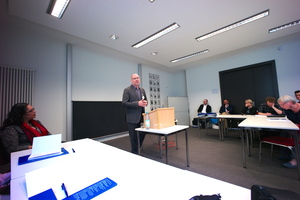 So, I arrived in Berlin on the 6th of June to participatein the first event which is a joint 'Summer School' program that is hosted by the Humboldt University, Stellenbosch University (where I teach), the University of KwaZulu Natal (UKZN), and the University of the Western Cape (UWC). Each year we meet in South Africa in February or March, and then in Berlin in June.
So, I arrived in Berlin on the 6th of June to participatein the first event which is a joint 'Summer School' program that is hosted by the Humboldt University, Stellenbosch University (where I teach), the University of KwaZulu Natal (UKZN), and the University of the Western Cape (UWC). Each year we meet in South Africa in February or March, and then in Berlin in June.
It was so wonderful to be here with South African and German colleagues - the event was arranged by Dr Clemens Wustmans from the Humboldt University and our topic was 'Religion, sustainability and politics'. The presenters included scientists, literary theorists, development specialists, religious scholars and theologians.
In this picture you will see Prof Meireis. As mentioned I was in Berlin at his invitation. In part it was also to work on a joint research grant application for a project that he and I will collaborate on. The project focuses in the ethics of 'Welfare pluralism' in South Africa and Germany - in particular how notions of welfare are conceived and who participates in the conception and expression of these concepts (the state, civil society and the religious sector, the private sector etc.) I really hope that this project will be successful! It will be a great development for my academic career, and it will also mean that I will spend a lot more time with Torsten and time in Berlin! So, I will keep you updated on how that develops!
At the summer school I presented a paper entitled 'Thinking 'olive' instead of 'red' or 'green': Seeking to bring together sustainability and development discourses in Southern African Methodist Ethics'. The paper will be finalised and prepared for publication. In the meantime, here is a short Youtube video from my series 'It's not a lecture... Just a thought!' on this topic. You will also get to see some of Berlin and my beautiful Brompton Bicycle on this trip!
Then, on the 12th of June I went to the University of Bamberg where I did a public lecture with Prof Thomas Wabel who is also an ethicist and Public Theologian. The purpose of the visit (other than the lecture) was to hand over the 'leadership' of the Global Network for Public Theology from Stellenbosch (where we hosted the last global gathering in October 2016) to Bamberg where the next gathering will take place in 2019. Thomas takes over as the hosting chair, and I will serve (at the behest of Prof Nico Koopman) as the outgoing hosting 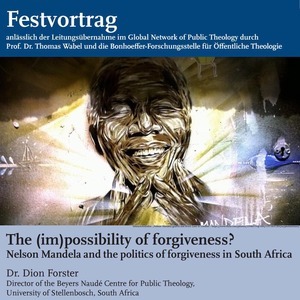 chair on the international commitee. Bamberg was amazing! It is such a beautiful city! The lecture itself went well, as did the meetings. I was so surprised to see my colleague Prof Smanga Kumalo from UKZN and Seth Mokitimi Methodist Seminary (SMMS) arrive at the lecture! He had come to the city for some meetings and heard I was doing the lecture and so attended. That was very special. Here is a poster for the lecture, and a picture of Smanga and I before the event. The title of my lecture was ‘The (im)possibility of forgiveness? Nelson Mandela and the Politics of forgiveness in South Africa’.
chair on the international commitee. Bamberg was amazing! It is such a beautiful city! The lecture itself went well, as did the meetings. I was so surprised to see my colleague Prof Smanga Kumalo from UKZN and Seth Mokitimi Methodist Seminary (SMMS) arrive at the lecture! He had come to the city for some meetings and heard I was doing the lecture and so attended. That was very special. Here is a poster for the lecture, and a picture of Smanga and I before the event. The title of my lecture was ‘The (im)possibility of forgiveness? Nelson Mandela and the Politics of forgiveness in South Africa’.
The lecture is based on two large research projects that I have just concluded (if you see my youtube channel you will find details of both). They are, the research and work that I have been doing on Nelson Mandela and political theologies in South Africa, and my 2nd PHD (which I handed in at Radboud University on 14 May 2017!) which is entitled ‘The (im)possibility of forgiveness? An empirical intercultural Bible reading of Matthew 18.15-35’. In that research project I did a 3 year qualitative empirical study on how Black and White South African Christians conceptualize, understand, and express notions and processes of forgiveness in contemporary South Africa with its significant economic, social, political and racial divides.
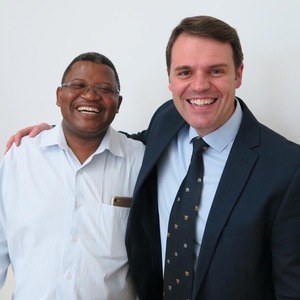
The lecture went off well and there was a lively discussion afterwards. The President of the Bamberg University, Prof Ruppert, attended the event which was a great honor. Here is a picture of myself and Prof Thomas Wabel, where the 'GNPT' Batik cloth was handed over.
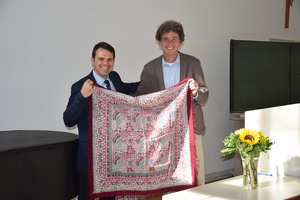
After returning from Bamberg I came back to Berlin to participate in the G20 Interfaith Meetings in Potsdam. This was a wonderful opportunity to further discuss the role of religion in the G20 nations in relation to sustainable development and migration - which are significant and important topics currently. What I found so interesting is the very important role that the G20 places upon religion and the religious across the world. The Pew Researcher (Brian Grim) spoke about their research that shows that 84% of global citizens identify that they are religious. This is significant. Of course we know that religion is often a source of conflict and social division, even abuse. Yet, at the same time it is also a great source of transformation, care, development and change. I was so grateful to be at this event thanks to my colleague and friend from Oxford University, Dr Peter Petkoff (pictured here).
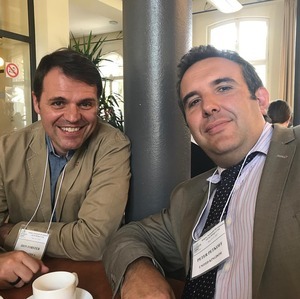
Now I am on the last stretch of my stay in Berlin. Today and tomorrow I shall participate in the opening conference of the Berlin Institute for Public theology (of which I am a member). I will be speaking on Public Theology, globalization, politics and economics tomorrow. My paper is written, but I feel that I still need to rework it a little before I present. By Friday evening I shall be home with Megie, Liam and Courtney! I cannot wait.
Trips like these are always so wonderful and significant. But, my goodness, there is nothing quite like being home with my family!
 Wednesday, May 24, 2017 at 2:26PM
Wednesday, May 24, 2017 at 2:26PM You may have noticed that I have not been posting to my BLOG as regularly in recent months. In part this is because Squarespace no longer supports posting to version 5 sites from their iOS apps. I mostly posted to my BLOG from my iPad or iPhone. So, if anyone has a solution for this please let me know! I would love to be able to post more regularly but need to be able to do so from my iPhone or iPad.
Well, here is a post that I prepared about two weeks ago when I was in Belgium.
In today’s VLOG I travel to Leuven in Belgium for a conference with my friend Prof Kobus Kok. It is a wonderful journey, and so much fun with my Brompton bicycle (cycle, train, bus, cycle!) It is awesome. But, I notice that the demographics of the Netherlands and Belgium differ somewhat. This got me thinking about the current concerns in Europe, the USA and elsewhere about refugees, ‘closing’ one’s borders, BREXIT and of course Turkey, France and Trump’s USA.
I discuss John Rawls’ Theory of Justice as one way of viewing how we might structure our societies economically and politically if we have a concern for our past history and our future shared wellbeing.
See John Rawls’ ‘A theory of justice’ here: http://amzn.to/2qg83OI
Thanks for watching! As always, I would love to hear your comments, suggestions, ideas, feedback and questions!
Please subscribe and like the video!
You can follow me on:
Academia (research profile): https://sun.academia.edu/DionForster
Twitter: http://www.twitter.com/digitaldion
Instagram: http://www.instagram.com/digitaldion
Web: http://www.dionforster.com
Thanks
I would love to hear your thoughts, comments, ideas!
 Wednesday, July 6, 2016 at 7:46AM
Wednesday, July 6, 2016 at 7:46AM I am all packed!
In just a short while I am heading to Basel in Switzerland for the XII International Bonhoeffer congress where I am delivering a paper see:
http://www.mission-21.org/en/agenda/agenda/events-from-mission-21/archive/2015/August/article/bonhoeffer-kongress/
My Brompton bicycle is all packed and loaded! I love this bike!
A video posted by digitaldion (@digitaldion) on
I will ride to Nijmegen station, catch the train to Basel and ride to the conference venue - viola! Just awesome!
My paper is on Bonhoeffer and Mandela in conversation around (African) Christian humanism. I will post more details here and on Twitter @digitaldion during the week.